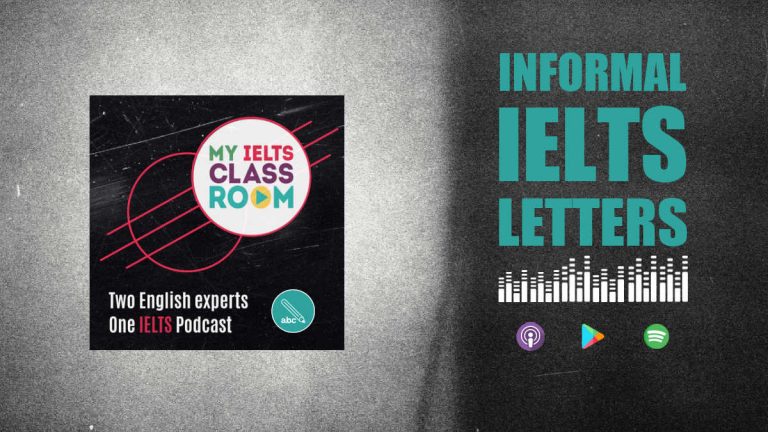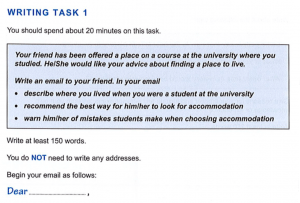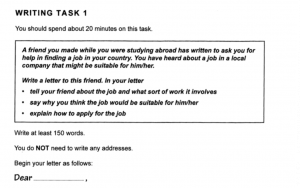
Perfecting your IELTS Informal Letter
Hey! I have noticed over the last few years that IELTS test-takers really struggle to write letters that are genuinely informal. Even good students who follow all of the language rules for an IELTS informal letter send me one to mark that feel “cold” and “stiff” and simply still “too formal”. Why is that? Well, that is what I sat down this week to ponder, and the result is this podcast! Today, Nick and I will show you how you can turn your good IELTS informal letters into great ones by making PERSONAL COMMENTS.
Yes, those are often the missing element in a great IELTS letter. We will give you examples of good letters that contain no comments and then show how adding small references to your personal relationship with the recipient can really make a huge difference to your tone. And, why is tone important? Well, it is the quality of your tone that more or less dictates your score for Task Achievement, which is one quarter of your overall score for General Training Task 1.
Below, you can find a summary of the episode, which includes all of the links to useful materials and the times of each part of the discussion (so you can go directly to the part you want to listen to). You can also find every episode of the podcast here 🚀
- Subscribe to My IELTS Classroom podcast on Apple podcasts here
- Subscribe to My IELTS Classroom on Google podcasts here
- Become a Patreon to gain access to extra BONUS episodes here

Perfecting your IELTS Informal Letter: Summary
The problem students face when writing an IELTS informal letter
There are definite rules that every IELTS test-taker should be following to make sure that their letter has the right tone. I have made a free video that goes through all of the language differences between informal, semi-formal, and formal letters, which you can watch here. Seriously, if you haven’t watched this lesson yet, you are missing out on clear advice about how to modify your language to make sure that you have the right tone.
However, I have noticed that even when students use contractions, add discourse markers, and shorten the length of their sentences, the IELTS informal letter that they produce still does not feel like a genuine letter to a friend. This is particularly true when the prompt asks the test-taker to give a lot of information. When this happens, the letters tend to feel like a list of details and there is none of the warmth or friendliness that you would expect in a letter to a person you know well. In other words, the student produces a letter that still feels too formal even though they are doing “the right things”
The solution to writing a genuinely good IELTS informal letter!
I have spent a lot of time recently trying to understand what is happening when students write the body of an IELTS informal letter. I realised that it was NOT that the students were not addressing the bullets in the prompt – almost every student I teach knows that it is imperative to do this and takes time and care to ensure that all points are addressed in full. No, the problem is that almost all informal letters written by test-takers are missing PERSONAL COMMENTS.
What do I mean by personal comments? Well, I mean the small clauses that we add when we are writing to a friend to show that there is a genuine relationship between us. The sentences that refer to our personal history or acknowledge our understanding of our friends. These could be comments that
- acknowledge what your friend likes or doesn’t like
- refer to how easy / difficult / fun / annoying an action will be (there is no limit to the range of feelings you could add here!)
- refer to a previous experience that you shared
- are specific to your friend or the letter (i.e. that use the names of their relatives, or the town where they grew up, etc)
- offer to help or support your friend
Seriously, adding these small comments can totally transform a good IELTS informal letter into a great one. In fact, I would strongly urge any test-taker who is aiming for a 7.0 or higher in IELTS writing to focus more on adding these PERSONAL COMMENTS to their letter rather than adding more information. Yes, we want to make sure that we address the bullets, but often students add information at the expense of tone. I would say it is far better to dedicate half of your words to sounding “friendly” than to write “lists” of information.
Example of adding personal comments to an IELTS Informal Letter
Let me show exactly what I mean by adding “personal comments” by showing you how you can write the body paragraphs for this IELTS prompt (taken from Cambridge IELTS 16).

Let’s imagine that a student writes this in response:
When I was a student, I lived in the halls of residence on Coburg Road. The room was quite large, and I had my own bathroom. It was also a good way to make friends as there were social events every weekend.
I think you should start by contacting the university to see if you can get a room in the halls. If that doesn’t work, you can always look in the local newspaper to see if there are any rooms to rent in a private house.
There are some things that you should avoid. Make sure that you don’t sign a contract for 12 months. You only want to rent for 9 as you will go home in the summer. Also, lots of students choose a flat that is close to the university, but you can usually find a better apartment at a cheaper rate if you go outside the university area.
I think that you will agree that this is already a strong piece of writing. The student has addressed all of the bullets in the prompt, there are no language errors, and, most importantly, the student has used the usual tools needed to make a letter “informal”. However, I just don’t think that this sounds like a letter that a person would actually send to a friend! It is just so….. cold!
So, what is the solution? Adding PERSONAL COMMENTS. Now, this letter is already on the long-side as there are around 150 words in the body alone, so we don’t want to add too many more sentences. All we want to do is add enough to make this letter feel that it really is being sent to a person that we know and love. Let me do that now. To help you see what I have added, I will put all of the personal comments in bold.
If you remember, when I was a student, I lived in the halls of residence on Coburg Road. The room was quite large, and I had my own bathroom. It was also a good way to make friends as there were social events every weekend. That’s how I met John and Pete, who you talked to at my birthday party in September.
I know that it sounds obvious, but I think you should start by contacting the university to see if you can get a room in the halls. If that doesn’t work, you can always look in the local newspaper to see if there are any rooms to rent in a private house. I don’t mind helping you do this one weekend – just let me know.
There are some things that you should avoid. Make sure that you don’t sign a contract for 12 months. You only want to rent for 9 as I guess you will go back to Dorchester in the summer. Also, lots of students choose a flat that is close to the university, but you can usually find a better apartment at a cheaper rate if you go outside Lenton. I think you’d like the vibe in Bailgate as there are lots of small shops and cafes, which I know you love.
Can you feel the difference? By adding these small phrases to the letter, it now feels 100% informal. Why? Because now I feel that this is a REAL letter to a REAL friend. How did I do that? Well, in this letter I
- acknowledged what my friend likes or doesn’t like (the area that has a lot of cafes, which I think they will love)
- referred to a previous experience that we shared (the house that I lived in and the people that my friend had met)
- mentioned details that are specific to my friend or the letter (the town where my friend lives and the specific areas that they should avoid)
- offered to help or support my friend (offering to help look in the newspaper)
These are small changes, but I do think that adding clauses to reinforce the relationship you have with the reader can result in a letter that is much stronger in terms of tone.
Let’s practice adding personal comments to an IELTS Informal Letter
Why don’t you practice doing this now? Let’s do the same activity for this prompt:

Below are 71 words that accurately address each of the bullets. What I would like you to do, is add some PERSONAL COMMENTS to improve the tone of the letter. You may want to add more information in the comments, but focus most on showing the connection between you and your friend. Then, scroll down to see what details Nick and I added.
The job is at the local football club. You would work on match days in the restaurant, serving food and showing the spectators to their seats.
I think that you would be good for the position because you like working with people and have some experience working in restaurants.
The newspaper said that to apply for the job you need to complete an application form online. Here is the address – www.leedsunited.com/jobs.
71 words
Want to learn how maximise your writing score with an ex-examiner? Then why not find out more about our Gold Writing Package. It contains everything you need to get a 7.0+ in Writing Task One and Task Two.

Nick’s improved IELTS informal letter!
I know you said you were a bit sick of working in hospitality after Pizza hut, but the job’s at Elland Road! If you fancy it, you would be working on match days in the club restaurant, mainly serving food and showing the fans to their seats. Nothing too difficult to be honest, and you get to watch the match for free!
I think that you’d be smashing for the position because I know you like working with people and already have some experience from the old Pizza Hut days, which obviously has a much worse clientele, so this should be a cake walk.
I just saw the ad in The Evening post this afternoon and it said that to apply for the job, you need to complete an application form online. Here is the address – www.leedsunited.com/jobs. It’s pretty simple – it just needs a CV uploaded and asks you to answer a couple of basic questions. I think you should go for it mate! I can help if you need a hand with anything.
174 words
Shelly’s improved IELTS informal letter!
I know you told me that you don’t want to work in hospitality anymore, but the job is at the local football club – Leeds United! You would work on match days in the restaurant, serving food and showing the spectators to their seats. Plus, you’d get to watch the match for free, which I know that you’d love!
I think that you would be good for the position because you like working with people and have experience working in restaurants. More importantly, you are a massive Leeds fan and only live five minutes from the stadium.
The newspaper said that to apply for the job you need to complete an application form online. Here is the address – www.leedsunited.com/jobs. I had a quick look, and it seems straightforward, but just let me know if you need any help filling it out.
142 words
